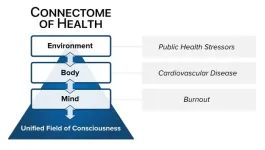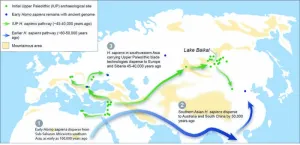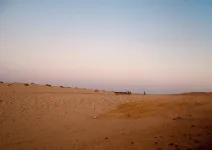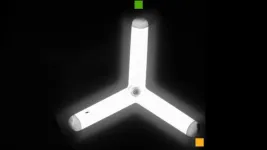(Press-News.org) PHILADELPHIA – A study in the Proceedings of the National Academy of Sciences (PNAS) identifies five factors that Annenberg Public Policy Center (APPC) researchers say reflect public assessments of science and are associated with public support for increasing funding of science and support for federal funding of basic research. These factors are whether science and scientists are perceived to be credible and prudent, and whether their work is perceived to be untainted by bias, self-correcting, and beneficial.
Drawing on 13 questions in APPC’s 2022 nationally representative Annenberg Science Knowledge survey (ASK) survey of 1,154 U.S. adults, researchers identified five factors that form a Factors Assessing Science’s Self-Preservation (FASS) model. The model can be used to assess the extent to which public perceptions align with the self-presentation of science and scientists live up to the ways in which they define themselves and their work to the public. (See Table 1 in the study for the 13 questions.)
The research team – APPC scholars Kathleen Hall Jamieson and Patrick E. Jamieson; Yotam Ophir of the University at Buffalo, State University of New York; and Dror Walter of Georgia State University – examined public perceptions of the extent to which scientists are credible and prudent, science or scientists adhere to their professed norms, and produce societal benefit and benefits for people like the survey respondents.
The study finds that among conservatives, increased perceptions that scientists are unbiased and prudent were positively associated with increased support for federal funding of basic scientific research. Among liberals, increased support for federal funding of basic scientific research was positively associated with heightened perception that science produces beneficial research.
Factors that predict support for science funding
“Science has gone through a rapid and intense politicization, with more Americans now deciding whether to get vaccinated or support climate action based not only on evidence and facts but also on their political ideology and identity,” says lead author Yotam Ophir, an APPC distinguished research fellow and Annenberg School for Communication Ph.D. “The FASS model allows us to identify the specific perceptions underlying beliefs and behaviors, and to highlight key differences in what matters to liberals and conservatives.”
The PNAS paper, he added, “shows how conservatives’ reluctance to fund scientific research is driven by perceptions that scientists are biased and lack prudence. Identifying these vulnerabilities can help science communicators craft more effective messages to communicate the importance and value of science.”
The researchers say the study helps to track “gaps” between science and scientists’ “professed and perceived identity, spot areas that may require corrective action or better communication, and monitor fears about or attacks on science.” Isolating factors on which conservatives and liberals differ helps advance understanding of the partisan responses to increased federal funding of science and support for basic researchers, the study says.
“Because they reliably reduce to five factors with significant predictive power, the ASK survey’s core questions make it possible to isolate both stability and changes in public perception of science and scientists across time,” says senior author Kathleen Hall Jamieson, APPC director and founder of the ASK survey. “APPC plans to field the survey yearly as a means of tracking public assessments of the wellbeing of science.”
“Not only is federal funding a major source of science support,” the researchers write, “but Congress is more likely than the private sector to agree to underwrite generating knowledge in service of public goods.”
The study takes note of a 2016 initiative emerging from an Annenberg Public Policy Center-Annenberg Foundation Trust at Sunnylands retreat convened by Robert Bradway, CEO of Amgen, and Subra Suresh, then president of Carnegie Mellon University and a former director of the National Science Foundation. Following the retreat, a group of nearly 40 business leaders argued in an ad in the Wall Street Journal that federal funding of basic research was an investment in the nation’s prosperity, security and well-being. In support of that claim, they noted that basic research was behind such innovations as the internet, smartphones, the Global Positioning System (GPS), magnetic resonance imaging (MRI), cancer proton therapy, and solar panels.
“Factors Assessing Science’s Self-Presentation model and their effect on conservatives’ and liberals’ support for funding science” by Yotam Ophir, Dror Walter, Patrick E. Jamieson, and Kathleen Hall Jamieson, was published September 11, 2023, in PNAS.
The Annenberg Public Policy Center was established in 1993 to educate the public and policy makers about communication’s role in advancing public understanding of political, science, and health issues at the local, state, and federal levels.
END
Five factors that assess well-being of science predict support for increasing US science funding
Factors capture differences between conservatives’ and liberals’ perceptions of science
2023-09-22
ELSE PRESS RELEASES FROM THIS DATE:
Editorial addresses clinician burnout with unifying systems medicine model
2023-09-22
A new editorial published in the Heart and Mind journal proposes an innovative systems medicine approach to address the epidemic of clinician burnout and holistically improve clinician mental health and wellbeing (Heart and Mind: September 18, 2023. | DOI: 10.4103/hm.HM-D-23-00013, published ahead of print).
In the US and globally, clinician burnout has reached epidemic levels, with over 50% of physicians and healthcare providers reporting symptoms. Besides impairing quality of life, burnout increases risk of mental health disorders, cardiovascular disease and impaired ...
Pollen analysis suggests peopling of Siberia and Europe by modern humans occurred during a major Pleistocene warming spell
2023-09-22
LAWRENCE — It’s an Ice Age mystery that’s been debated for decades among anthropologists: Exactly when and how did the flow of Homo sapiens in Eurasia happen? Did a cold snap or a warming spell drive early human movement from Africa into Europe and Asia?
A new study appearing in Science Advances compares Pleistocene vegetation communities around Lake Baikal in Siberia, Russia, to the oldest archeological traces of Homo sapiens in the region. The researchers use the “remarkable evidence” to tell a compelling story from 45,000-50,000 years ago with new detail: how the first humans migrated across ...
Many low- or middle-income countries unprepared for the battle against cardiovascular disease
2023-09-22
Most healthcare facilities in many Low- and Middle-income Countries (LMICs) are unprepared to treat patients with cardiovascular diseases – despite these conditions leading to millions of people dying prematurely every year, a new study reveals.
Experts analysed health survey data from eight LMICs across four World Health Organisation world regions to discover that most facilities are unprepared to deliver services to treat or manage cardiovascular disease risk factors (CVDRF) such as diabetes and hypertension.
However, the increased ...
Probing the deep genetic structure of Africa
2023-09-22
Africa is the birthplace of modern humans and the continent with the highest level of genetic diversity. While ancient DNA studies are revealing some aspects of the genetic structure of Africa before the spread of food production, issues concerning DNA preservation have limited the insights from ancient DNA. Hoping to find clues in modern populations, researchers from a Portuguese-Angolan TwinLab ventured into the Angolan Namib desert – a remote, multi-ethnic region where different traditions met. “We were able to locate groups which were thought to have disappeared more than 50 years ago”, states Jorge ...
UC San Diego Health named national leader in delivering high-quality patient care
2023-09-22
UC San Diego Health has been recognized as a top performer in the 2023 Bernard A. Birnbaum, MD, Quality Leadership Ranking by Vizient, Inc. for its excellence in delivering high-quality patient care. This achievement represents the fifth consecutive year that UC San Diego Health has been ranked among the top ten academic health systems in the United States.
“This incredible accomplishment is a direct result of the exceptional care provided each day by our multidisciplinary teams throughout our health system,” said Patty Maysent, CEO of UC San Diego Health. “We are extremely proud to have achieved this national honor now for five years in a row, which ...
Louisiana Cancer Research Center Associate Director of Administration Sven Davisson named Treasurer of Association of Independent Research Institutes
2023-09-22
Louisiana Cancer Research Center (LCRC) Associate Director of Administration Sven Davisson has been appointed to the board of the Association of Independent Research Institutes (AIRI).
During his two-year term, Davisson will serve as the organization’s treasurer. He has served the organization in various roles since 2012.
AIRI is a national association of independent, not-for-profit biomedical and behavioral research institutes whose mission is to enhance the ability of its members to improve human health and advance knowledge through networking, education, and involvement in the development of science ...
Discovery in mosquitoes could lead to new strategy against dengue fever and other mosquito-borne vectors
2023-09-22
Researchers from the Johns Hopkins Malaria Research Institute at the Johns Hopkins Bloomberg School of Public Health have made an important finding about Aedes aegypti mosquitoes—one that could one day lead to better methods for reducing the mosquito-to-human transmission of dengue, yellow fever, Zika, and other harmful and sometimes deadly viruses.
Ae. aegypti mosquitoes do not succumb to these viruses when infected and continue to move and feed normally. As such, the ...
The potential of solar cars in the world
2023-09-22
A new study, modeling the potential of solar-powered vehicles in the urban context in 100 cities across the world, shows that solar energy provides a range between 11 and 29 km per day, reducing charging needs by half.
Despite the rapid adoption of electric vehicles, the transport sector is still responsible for around a third of global carbon dioxide (CO2) emissions worldwide. Therefore, to achieve decarbonization targets, it is required to significantly decrease the emissions associated with mobility.
Integrating photovoltaic modules into ...
Fruit flies offer clues to how brains make reward-based decisions
2023-09-22
Like many collectors of L.P. records, James Fitzgerald’s brother-in-law has a favorite store where he consistently finds the best vinyl for his collection. But there are times when he spends hours at the store and comes up empty. He also knows that occasionally he should venture to the record store on the other side of town, where he sometimes scores a hard-to-find gem that was stocked since his last visit.
Fitzgerald’s brother-in-law is making a calculation: weighing probable outcomes to guide his behavior. His favorite record store ...
Pioneering health tracker for stroke survivors will use the body to transmit data
2023-09-22
AMHERST, Mass.—An interdisciplinary team led by University of Massachusetts Amherst researchers has been awarded $1.14 million over four years by the National Institutes of Health (NIH) to develop a revolutionary way of tracking body movements, with a primary application in stroke survivors’ rehabilitation and huge potential for future applications across a wide range of disciplines, health-related and beyond.
More than 795,000 Americans suffer from strokes annually, and nearly 80% of stroke survivors experience some degree ...
LAST 30 PRESS RELEASES:
Scientists discover why we know when to stop scratching an itch
A hidden reason inner ear cells die – and what it means for preventing hearing loss
Researchers discover how tuberculosis bacteria use a “stealth” mechanism to evade the immune system
New microscopy technique lets scientists see cells in unprecedented detail and color
Sometimes less is more: Scientists rethink how to pack medicine into tiny delivery capsules
Scientists build low-cost microscope to study living cells in zero gravity
The Biophysical Journal names Denis V. Titov the 2025 Paper of the Year-Early Career Investigator awardee
Scientists show how your body senses cold—and why menthol feels cool
Scientists deliver new molecule for getting DNA into cells
Study reveals insights about brain regions linked to OCD, informing potential treatments
Does ocean saltiness influence El Niño?
2026 Young Investigators: ONR celebrates new talent tackling warfighter challenges
Genetics help explain who gets the ‘telltale tingle’ from music, art and literature
Many Americans misunderstand medical aid in dying laws
Researchers publish landmark infectious disease study in ‘Science’
New NSF award supports innovative role-playing game approach to strengthening research security in academia
Kumar named to ACMA Emerging Leaders Program for 2026
AI language models could transform aquatic environmental risk assessment
New isotope tools reveal hidden pathways reshaping the global nitrogen cycle
Study reveals how antibiotic structure controls removal from water using biochar
Why chronic pain lasts longer in women: Immune cells offer clues
Toxic exposure creates epigenetic disease risk over 20 generations
More time spent on social media linked to steroid use intentions among boys and men
New study suggests a “kick it while it’s down” approach to cancer treatment could improve cure rates
Milken Institute, Ann Theodore Foundation launch new grant to support clinical trial for potential sarcoidosis treatment
New strategies boost effectiveness of CAR-NK therapy against cancer
Study: Adolescent cannabis use linked to doubling risk of psychotic and bipolar disorders
Invisible harms: drug-related deaths spike after hurricanes and tropical storms
Adolescent cannabis use and risk of psychotic, bipolar, depressive, and anxiety disorders
Anxiety, depression, and care barriers in adults with intellectual and developmental disabilities
[Press-News.org] Five factors that assess well-being of science predict support for increasing US science fundingFactors capture differences between conservatives’ and liberals’ perceptions of science






